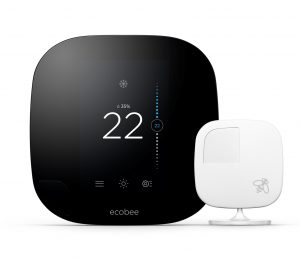There’s a million ways this Canadian technology company can help reduce energy waste, save money and save the planet.
But it needs your help.
ecobee is nearing a very significant corporate milestone, and it’s counting up to one million as the number of units sold to a growing community of smart tech users.

Rahul Raj, the vice-president of marketing and e-commerce at ecobee.
“We’re close…certainly by the end of the year, we will have more than a million installed,” described Rahul Raj, the vice-president of marketing and e-commerce at ecobee. The Toronto-based company develops, manufactures and markets Wi-Fi enabled smart thermostats that control heating and cooling systems in homes and businesses.
ecobee also has a mobile app for iOS, Android, and BlackBerry that lets its a user monitor, control and set-up their smart thermostat, and it offers small wireless sensors that can be used as part of the user’s own climate control system.
The idea, of course, is to better manage heating and cooling. If no one’s at home, why is the heat (or the A/C) on?
In pretty much any home, much of the energy bill is fuelled by heating and cooling costs. That’s exacerbated by HVAC systems that are in use in homes or rooms that are unoccupied, or set to temperatures that do not respond to changing weather in the immediate area.
So smart, programmable thermostats that control heating and A/C systems can lower the indoor temperature when the home’s not in use (or warm it up before it is) are becoming more and more popular. Such monitoring devices can also give real-time feedback on energy consumption and the costs that are borne as a result.
In Canada, four out of ten households have a programmable thermostat, and most people actually use them (83 per cent, according to Statistics Canada); Ontario is where most programmable thermostats are in use, with just over half of the households there saying they have one.
Natural Resources Canada recommends keeping thermostats two to three degrees lower than 21°C (the average household temperature in Canada) to get the most energy savings, and it does have tips for doing so even without special gadgets or dedicated products. It’s said that by reducing the indoor temperature to 18°C brings a 6.5 per cent savings in natural gas and a 0.8 per cent decrease in electricity consumption.
ecobee sees the opportunity to reduce energy waste and the costs associated with unnecessary energy consumption as a multi-billion dollar market.
But even outside the market cap associated with their product, Raj says ecobee sees the opportunity to have a monumentally positive impact on society.
“At the moment,” Raj explains, “most people agree that the way we are currently living is not sustainable. We enjoy a remarkable level of quality of life, and it is presumptuous that we should think that others shouldn’t want or get the same quality of life.”
But not at the expense of global warming. Raj says ecobee is extremely focused on finding a solution, one that does not require a trade-off between our comfort and the health of the planet.
“We do that by eliminating waste, by reducing unnecessary or inappropriate heating and cooling,” he says plainly.

ecobee was the first smart thermometer product with Wi-Fi remote control capabilities; extra sensors can be used in larger homes to manage temperatures in specific areas.
Customers are saving 23 per cent on their heating and cooling bills, Raj says, using ecobee’s auto-scheduling and data rhythm features that adjust energy usage while keeping up a comfortable environment at home. The latest iteration of the system can interact with big data on the Web, such as weather forecasts, and make appropriate heating and cooling adjustments automatically. With its optional sensors, individual rooms or areas in the home can be separately monitored and controlled, and its motion detection capabilities can help determine if any heating or cooling at all is needed.
As the company nears its one million install landmark and establishes itself as the leader in the remote control smart thermostat marketspace, Raj says the ecobee team has even more planet-saving ideas in store.
He notes that ecobee was the first smart thermometer product with Wi-Fi remote control capabilities, and that it has gone on to add voice control features and an enhanced interface and colour touchscreen. The product is now available from Apple and from Amazon, and it has done very well for itself in battle with competitor’s products like Google-owned Nest and long-time market leader Honeywell.
In the coming months, as it achieves a Number One spot, Raj says the company will continue on its positive trajectory: “We’ve establish a pattern of product innovation and partnering with other companies; expect more of the same scale of development” going forward.
He’s convinced that the company, its customers and the planet will all benefit with the smart use of smart technologies in the home.

Canadian Tech Company has Million Ways to Reduce Waste, Save Money, Save the Planet
-30-




In an update to the story, ecobee has secured a $35 million funding round from Amazon Alexa Fund, Thomvest and Relay Ventures to continue its work on wireless thermostats, room sensors, and smart home integration.
LR